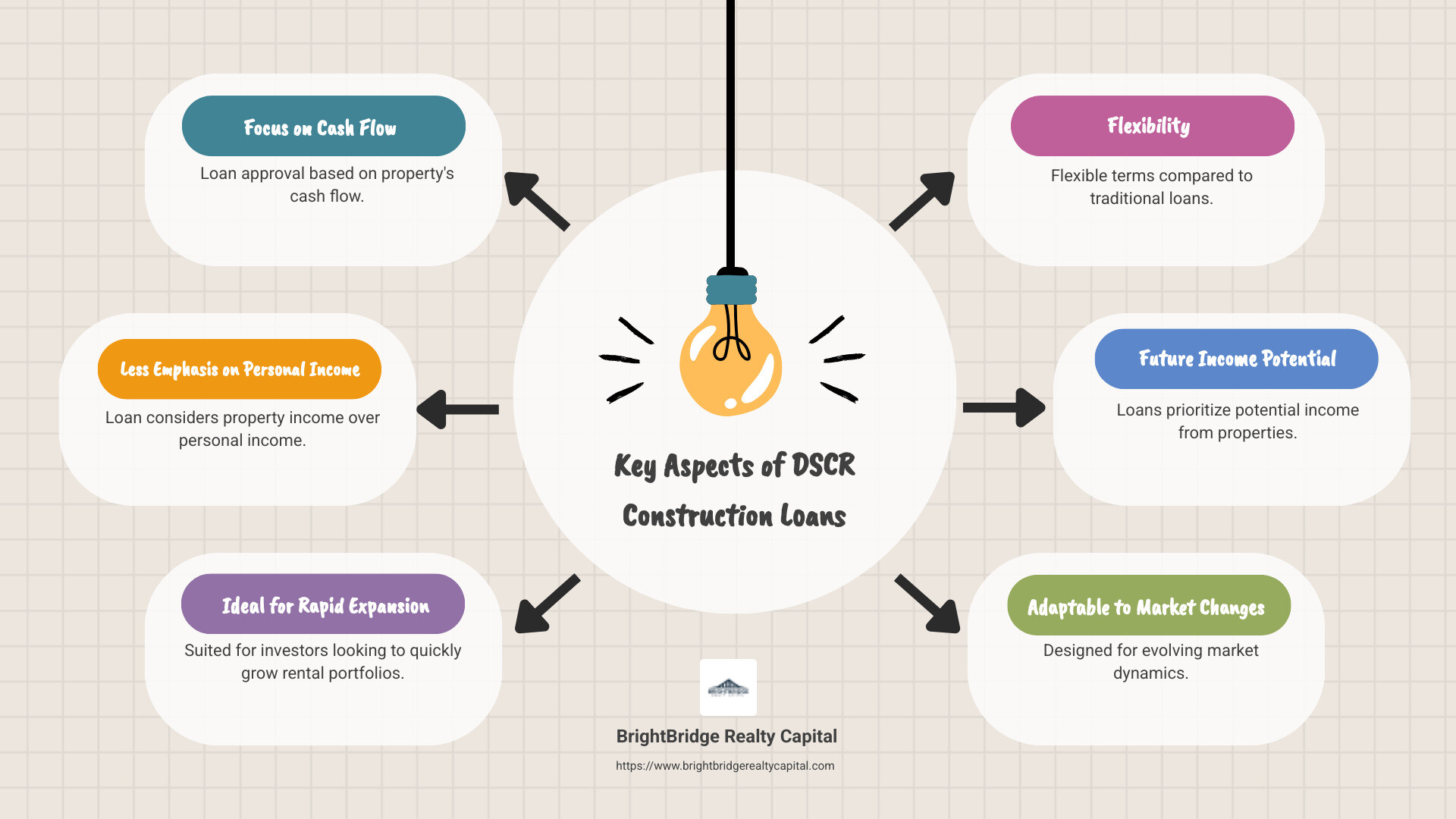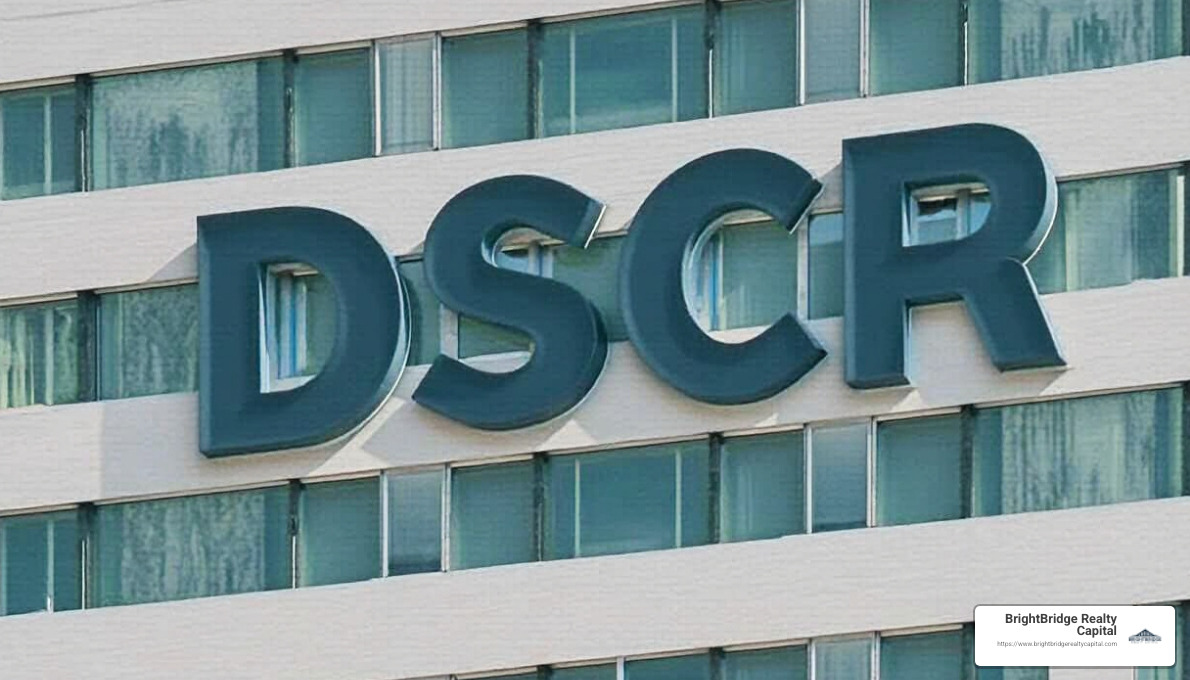Understanding DSCR Construction Loans: A Comprehensive Guide

DSCR construction loan is a key term every real estate investor should understand. These loans offer a strategic way to fund income-generating properties by focusing on the property's cash flow rather than personal income.
- DSCR Construction Loan: Focuses on property cash flow for loan approval
- Key Advantage: Less emphasis on personal income, more on property revenue
- Ideal For: Investors looking to build or expand rental portfolios quickly
In real estate investment, navigating financing options can be a maze. Yet, understanding the right tools can open up significant opportunities. From new builds to renovations, choosing the right type of loan early on can dramatically impact your project's success.
DSCR construction loans, particularly, provide flexibility and a focus on future income potential. As the market dynamics continue to evolve, these loans become a fitting choice for those eyeing quick expansion without the burdensome await of traditional loan processes.

What is a DSCR Construction Loan?
How DSCR Loans Work
A DSCR construction loan is a unique financing option that focuses on a property's future cash flow rather than the borrower's personal financial history. This makes it an appealing choice for real estate investors who are more concerned with a property's potential to generate income.
How does it work?
At its core, a DSCR construction loan evaluates a property's ability to cover its debt obligations through its income. This is measured by the Debt Service Coverage Ratio (DSCR), which compares the property's net operating income (NOI) to its total debt service (TDS).

- Net Operating Income (NOI): This is the income generated by the property after subtracting operating expenses like property taxes, insurance, and management fees.
- Total Debt Service (TDS): This includes all loan payments, covering both principal and interest.
A DSCR above 1.0 indicates the property is generating more income than needed to cover its debt. For instance, a DSCR of 1.25 means the property earns 25% more income than required for its debt payments.
Loan Approval Process
For a DSCR construction loan, lenders emphasize the projected income of the property. Instead of digging into the borrower's personal finances, they focus on whether the future cash flow will be sufficient to meet debt obligations. This approach allows investors to secure funding based on the property's potential rather than personal credit scores or income documentation.
Income-Generating Properties
These loans are typically used for properties expected to produce rental income, such as apartment complexes, commercial spaces, or mixed-use developments. The ability to generate consistent income is crucial, as it reassures lenders that the debt will be serviced reliably.
Flexibility and Opportunity
DSCR construction loans offer flexibility, particularly for investors with complex financial backgrounds or multiple investments. The emphasis on cash flow rather than personal income opens doors to financing opportunities that might otherwise be inaccessible.
In summary, understanding how DSCR loans work is essential for real estate investors aiming to expand their portfolios with income-generating properties. By focusing on the property's income potential, these loans provide a strategic advantage in the competitive real estate market.
Advantages of DSCR Construction Loans
Comparison with Traditional Loans
Flexibility and Portfolio Expansion
One of the standout features of DSCR construction loans is their flexibility. Unlike traditional loans, which often require a rigid set of documentation and borrower qualifications, DSCR loans prioritize the property's cash flow. This approach benefits investors with diverse or non-traditional income sources. It allows them to expand their real estate portfolios without being constrained by personal financial metrics.
For seasoned investors, this means more opportunities to grow and diversify their holdings. By focusing on the income potential of properties, DSCR loans enable the funding of new construction projects and significant renovations. This can lead to strategic investments that might not be possible with traditional financing.
Income Potential
DSCR loans focus on the potential income a property can generate, which is a crucial factor for real estate investors. This emphasis on cash flow over personal income opens up avenues for those who might have complex financial backgrounds. Investors can capitalize on properties with promising income streams, leveraging the loan to maximize returns.
Documentation Requirements
When it comes to documentation, DSCR loans are more lenient compared to traditional loans. The primary concern for lenders is the projected cash flow of the property, not the borrower's credit score or detailed financial history. This means less paperwork for investors, which can speed up the approval process and allow for quicker capital deployment.
Interest Rates
While DSCR loans often come with higher interest rates due to perceived risks, they provide access to financing opportunities that traditional loans might not offer. This trade-off can be worthwhile for investors who prioritize the ability to secure funding based on a property's potential income.
Borrower Qualifications
Traditional loans typically require borrowers to have strong credit scores and stable income sources. In contrast, DSCR loans are more accommodating. They cater to a wider range of investors, including those with multiple investments or unconventional income streams. This inclusivity can be a game-changer for investors looking to enter or expand in the real estate market without the constraints of traditional loan qualifications.
The advantages of DSCR construction loans lie in their flexibility and focus on property income potential. These loans cater to investors who are keen on portfolio expansion and seek financing solutions that align with their strategic goals.
How to Qualify for a DSCR Construction Loan
Key Requirements
Qualifying for a DSCR construction loan involves understanding a few key requirements. These focus on the property's income potential rather than just the borrower's personal financial history.
DSCR Requirements
The Debt Service Coverage Ratio (DSCR) is a crucial metric. It compares the property's net operating income to its debt obligations. A good DSCR is typically above 1.25, indicating that the property generates enough income to cover its debts comfortably. A higher DSCR not only improves your chances of loan approval but may also result in more favorable loan terms.
Credit Score
While DSCR loans are less reliant on personal credit scores, a minimum score of 680 is often required. Some lenders might set the bar higher, especially for the best loan terms. A good credit score can bolster your application, reflecting your reliability in managing financial obligations.
Loan-to-Value Ratio (LTV)
The loan-to-value ratio is another key factor. For DSCR loans, you might need a down payment of 20-30%, resulting in an LTV of 70-80%. This means you must be prepared to invest a significant amount upfront to secure the loan.
Financial Projections
Lenders will expect detailed financial projections. These should outline how the property will generate income and cover debts. Clear and realistic projections build lender confidence in your project's viability.
Business Plan
A comprehensive business plan is essential. It should highlight expected revenue streams and expenses, demonstrating the construction investment's feasibility. A strong business plan can significantly improve your loan application.
Borrower Experience
Experience in real estate is a definite plus. Lenders favor seasoned investors with a proven track record of successful projects. Your past experience can reassure lenders of your ability to manage and profit from the investment.
In summary, qualifying for a DSCR construction loan requires a strong focus on the property's income potential, backed by solid financial projections and a robust business plan. Meeting these requirements can open the door to flexible financing options custom to your investment goals.
Alternative Financing Options
Combining Financing Strategies
When it comes to real estate investment, having a flexible approach to financing can be a game-changer. Investors often combine different financing strategies to optimize their investment returns. Let's explore some of these options, including construction loans, fix-and-flip loans, and bridge loans.
Construction Loans
Construction loans are designed for ground-up projects. They cover costs like land, materials, and labor. These loans are short-term, typically lasting until the project is complete. Funds are usually disbursed in stages, aligning with construction milestones.
- Pros: Ideal for new builds, covering all construction-related costs.
- Cons: Short-term nature means you'll need to refinance once the project is complete.
Fix-and-Flip Loans
Fix-and-flip loans cater to investors who buy, renovate, and sell properties quickly. These loans provide the upfront capital needed for purchase and renovation.
- Pros: Quick access to funds for purchasing and renovating properties.
- Cons: Not suitable for long-term holding; refinancing is necessary if you decide to keep the property.
Bridge Loans
Bridge loans are temporary and help bridge the gap between immediate financing needs and permanent solutions. They offer quick approval and funding, making them ideal for urgent purchases or pre-construction costs.
- Pros: Fast approval and funding; useful for urgent financing needs.
- Cons: Short-term, so a long-term solution will be needed eventually.
Short-Term Solutions and Refinancing
Each of these loans serves as a short-term solution. Once your project is completed or stabilized, refinancing becomes crucial. This is where DSCR construction loans shine, providing a long-term financing option custom for income-generating properties. Refinancing into a DSCR loan can help you secure better terms and open up the property's income potential.
Aligning with Investment Goals
The key to successful financing is aligning your strategy with your investment goals. For instance, if your aim is to generate rental income, transitioning from a fix-and-flip loan to a DSCR loan after renovations can be beneficial. Alternatively, if your goal is to expand your portfolio, bridge loans can help you quickly acquire new properties, which can later be refinanced.
In conclusion, combining various financing strategies allows you to tailor your approach to your specific investment goals. Whether you're constructing a new building, flipping a property, or bridging a finance gap, the right mix of loans can improve your real estate ventures.

Frequently Asked Questions about DSCR Construction Loans
Can DSCR loans be used for construction?
Can you use a DSCR loan for construction? The short answer is yes, but with conditions. DSCR loans focus on a property's ability to generate income. This makes them tricky for construction since the property isn't generating income yet.
However, there are exceptions:
- Pre-leased properties: If parts of the property are leased before construction finishes, a DSCR loan might work.
- Phased construction projects: If completed parts of a project generate income while other parts are still under construction.
These scenarios can make a DSCR construction loan feasible, but they are less common.
What is a good DSCR ratio?
A good DSCR ratio is crucial for loan approval. Generally, a DSCR above 1.0 means the property earns more income than needed to cover its debts.
- 1.25 or higher: Often considered strong. It indicates a comfortable margin for covering debt payments.
- Below 1.0: Suggests the property might struggle to meet its debt obligations, making loan approval difficult.
A higher DSCR reassures lenders that the property can handle its debt. This makes it a key factor in securing a DSCR construction loan.
How do DSCR loans differ from traditional loans?
DSCR loans and traditional loans have several differences:
- Focus: DSCR loans emphasize the property's cash flow, while traditional loans focus on the borrower's personal finances.
- Documentation: DSCR loans require less personal financial documentation. Traditional loans need extensive paperwork, like tax returns and credit reports.
- Interest Rates: DSCR loans often have higher interest rates due to perceived risk. Traditional loans usually offer lower rates for borrowers with strong credit.
- Flexibility: DSCR loans are more flexible, catering to investors with varied financial backgrounds. Traditional loans favor stable income sources.
Understanding these differences helps investors choose the right loan for their needs.
Conclusion
In real estate financing, strategic planning is essential. Whether you're building from the ground up or expanding a rental portfolio, having a clear financial strategy is key. This is where BrightBridge Realty Capital comes in.
At BrightBridge Realty Capital, we specialize in offering customized real estate financing solutions. Our DSCR construction loans provide the flexibility and speed needed to seize opportunities in the ever-changing real estate market. With our fast closing times, often within a week, and direct lending approach, we eliminate the middleman, offering competitive rates and a seamless process.
Why choose BrightBridge Realty Capital?
- Nationwide Reach: No matter where your project is located, we have the expertise and resources to support your investment goals.
- Quick, Flexible Funding: Our process is designed to be hassle-free, with quick approvals and funding to keep your projects on track.
- Expert Guidance: Our team of real estate investment experts is dedicated to guiding you through every step of the financing process.
Strategic planning and informed decision-making are crucial for successful real estate investments. By understanding and leveraging the benefits of DSCR construction loans, investors can open up significant growth potential and stability in their portfolios.
Ready to take the next step in your real estate journey? Explore our financing solutions and see how we can help you achieve your investment goals. Let's build a brighter future together with BrightBridge Realty Capital.


